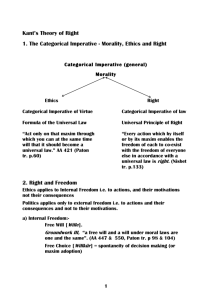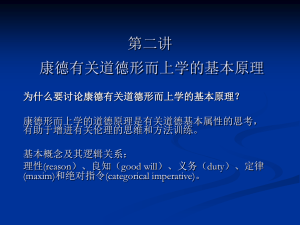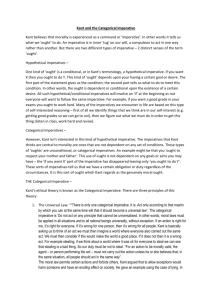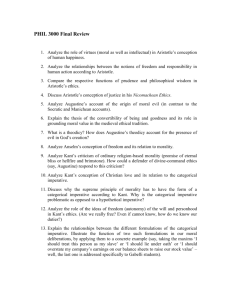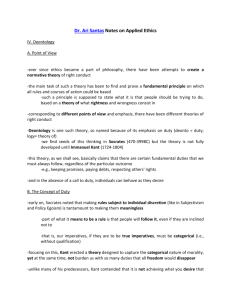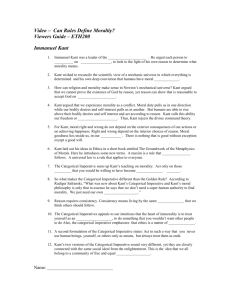Kant`s Four Examples
advertisement
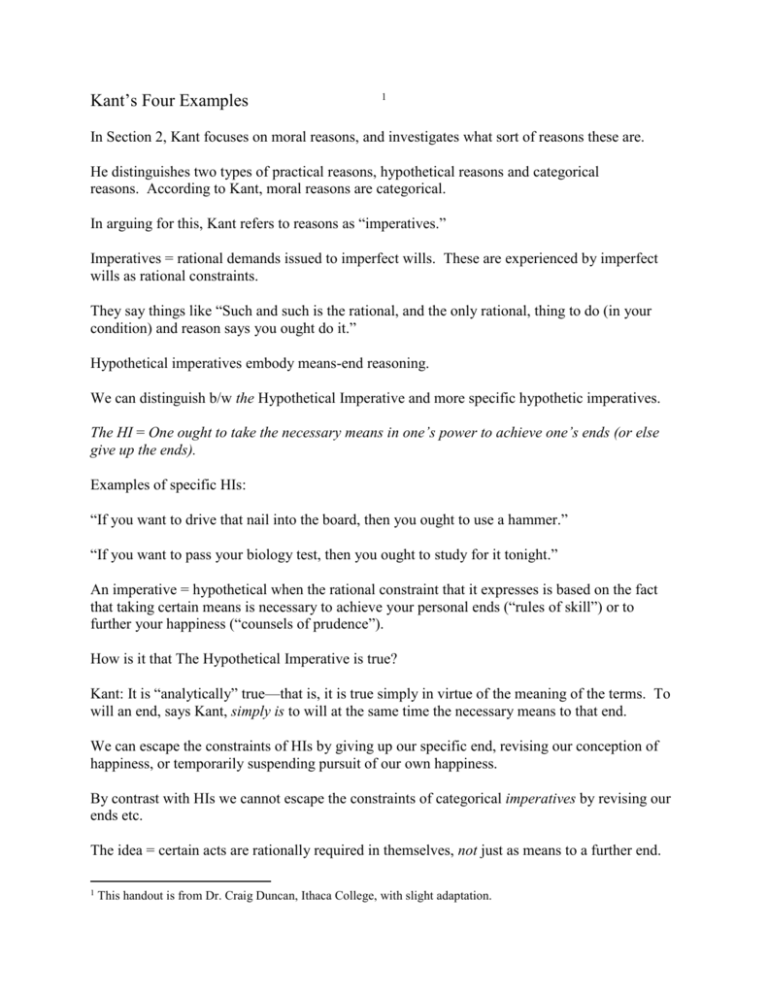
Kant’s Four Examples 1 In Section 2, Kant focuses on moral reasons, and investigates what sort of reasons these are. He distinguishes two types of practical reasons, hypothetical reasons and categorical reasons. According to Kant, moral reasons are categorical. In arguing for this, Kant refers to reasons as “imperatives.” Imperatives = rational demands issued to imperfect wills. These are experienced by imperfect wills as rational constraints. They say things like “Such and such is the rational, and the only rational, thing to do (in your condition) and reason says you ought do it.” Hypothetical imperatives embody means-end reasoning. We can distinguish b/w the Hypothetical Imperative and more specific hypothetic imperatives. The HI = One ought to take the necessary means in one’s power to achieve one’s ends (or else give up the ends). Examples of specific HIs: “If you want to drive that nail into the board, then you ought to use a hammer.” “If you want to pass your biology test, then you ought to study for it tonight.” An imperative = hypothetical when the rational constraint that it expresses is based on the fact that taking certain means is necessary to achieve your personal ends (“rules of skill”) or to further your happiness (“counsels of prudence”). How is it that The Hypothetical Imperative is true? Kant: It is “analytically” true—that is, it is true simply in virtue of the meaning of the terms. To will an end, says Kant, simply is to will at the same time the necessary means to that end. We can escape the constraints of HIs by giving up our specific end, revising our conception of happiness, or temporarily suspending pursuit of our own happiness. By contrast with HIs we cannot escape the constraints of categorical imperatives by revising our ends etc. The idea = certain acts are rationally required in themselves, not just as means to a further end. 1 This handout is from Dr. Craig Duncan, Ithaca College, with slight adaptation. Now, recall from our earlier notes any genuine rational principle of conduct will be universally valid (that is, all principles can be stated in generic forms that all people should accept). But although all rational principles have universal validity, we can distinguish b/w universal and non-universal bindingness. Hypothetical imperatives are universally valid, but are not rationally binding in all circumstances, since they apply only to people who aim at the ends they specify. By contrast, categorical imperatives = universally valid, and rationally binding in all circumstances. This is the hallmark of a moral reason: one cannot escape its bindingness simply by changing one’s desires, goals, or feelings. As in the case of hypothetical imperatives, with categorical imperatives we can distinguish b/w The Categorical Imperative, and other more specific categorical imperatives. The Categorical Imperative = I ought never to act except in such a way that I could also will that my maxim should become a universal law. Examples of more specific categorical imperatives: One ought not to make a lying promise. One ought not to steal books from the library. In Section 2, Kant gives four famous examples of The CI in action: 1. The suicide example: a1 = the act of suicide the man is thinking about doing Maxim M(a1) = “Whenever continuing to live will bring me more pain than pleasure, I shall commit suicide out of self-love.” Kant’ss argument: 1. M(a1) cannot be a universal law. 2. If M(a1) cannot be a universal law, then no one can consistently will that M(a1) be a universal law. 3. a1 is morally right if and only if the agent thinking about doing a1 can consistently will that M(a1) be a universal law. (The Categorical Imperative) 4. Therefore, a1 is not morally right. 2. The lying-promise example a2 = the lying-promise the man is thinking about doing Maxim M(a2) = “Whenever I need money, then I shall borrow the money and promise to repay, even though I know I will not repay.” Kant’s argument: same as in example 1, just replace “a1” with “a2”. 3. The Rusting Talents Example a3 = the act of letting all of one’s talents rust Maxim M(a3) = When I am comfortable as I am, I shall let all of my talents rust. Kant’s argument: 1. Everyone necessarily wills that some of his or her talents be developed. 2. If everyone necessarily wills that some of his or her talents be developed, then no one can consistently will that M(a3) be a universal law. 3. a3 is morally right if and only if the agent thinking about doing a3 can consistently will that M(a3) be a universal law. (The Categorical Imperative) 4. Therefore, a3 is not morally right. 4. The Helping Others Example a4 = the act of giving nothing to charity Maxim M(a4) = When I am flourishing and others are in distress, I shall give nothing to charity. Kant’s argument: 1. Everyone necessarily wills that he or she be helped in desperate circumstances. 2. If everyone necessarily wills this, then no one can consistently will that M(a4) be a universal law. 3. a4 is morally right if and only if the agent thinking about doing a4 can consistently will that M(a4) be a universal law. (The Categorical Imperative) 4. Therefore, a4 is not morally right. These four examples are all applications of Kant’s Categorical Imperative: “Act only in accordance with that maxim through which you can at the same time will that it become universal law.” Interestingly, Kant gave several different formulations of the Categorical Imperative, which he claimed to be equivalent in meaning. The version above is known as the Formula of Universal Law. Another well-known version is the Formula of the End in Itself: “So act that you treat humanity, whether in your own person or in the person of any other, always at the same time as an end, never merely as a means.” Kant’s idea here is that one should not treat others in ways they couldn’t rationally assent to. Why does Kant think these two formulas are equivalent? Perhaps the connection is this: If I cannot will maxim M as universal law, then I am acting for reasons that it is not possible for everyone to share. But to act toward people on the basis of reasons they cannot possibly share is to use them, to treat them as a mere means to my goals.

